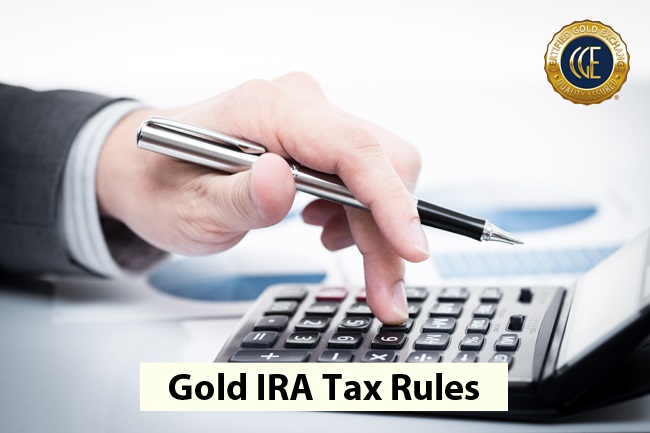Yes, there are tax implications when converting to a Gold IRA. The conversion is treated as a taxable event.
Investing in a Gold IRA can diversify your retirement portfolio. Understanding the tax implications is crucial. When you convert a traditional IRA to a Gold IRA, the transaction is taxable. You’ll owe taxes on the amount converted at your current income tax rate.
This can significantly impact your financial planning. A Roth IRA conversion to a Gold IRA also incurs taxes, but future withdrawals are tax-free. Always consult with a tax advisor before making such conversions. Proper planning ensures you maximize the benefits while minimizing tax liabilities. Investing in precious metals offers security, but being aware of tax rules is essential for a smooth transition.

Introduction To Gold Iras
Investors seek ways to diversify their portfolios. One popular option is the Gold IRA. This type of retirement account allows individuals to invest in physical gold. Understanding the basics of Gold IRAs helps make informed decisions. In this section, we will explore what a Gold IRA is and its growing popularity.
What Is A Gold Ira?
A Gold IRA is a self-directed Individual Retirement Account. It allows investments in physical gold, silver, platinum, and palladium. These precious metals must meet specific purity standards. The account is held by a custodian who handles the investments.
Gold IRAs offer tax advantages similar to traditional IRAs. Contributions may be tax-deductible. Withdrawals are taxed as income. This makes Gold IRAs an attractive option for retirement savings.
Investors can choose to hold gold coins or bars. The gold must be stored in an IRS-approved depository. This ensures the safety and security of the investment.
Popularity And Growth
Gold IRAs have gained popularity in recent years. Economic uncertainty drives investors to seek stable assets. Gold is often seen as a safe haven during market fluctuations.
According to recent studies, more people are turning to Gold IRAs. The growth can be attributed to several factors:
- Economic instability: Investors seek protection against inflation and currency devaluation.
- Diversification: Adding gold to a portfolio reduces risk.
- Tax benefits: Gold IRAs offer similar tax advantages to traditional IRAs.
Financial advisors often recommend diversifying with precious metals. This strategy helps protect against market volatility. As a result, Gold IRAs continue to grow in popularity.
Benefits Of Gold Iras
Considering the benefits of Gold IRAs can help secure your financial future. Gold IRAs offer many advantages for investors. They are a smart choice for diversifying and protecting your wealth.
Hedge Against Inflation
Gold is a great hedge against inflation. Its value often rises when the dollar falls. This can protect your savings during economic downturns. Gold has maintained its value over time. This makes it a reliable store of wealth.
Portfolio Diversification
Diversification is crucial for a balanced investment portfolio. Adding gold to your IRA can reduce risk. Gold has a low correlation with other assets. This means it often performs well when stocks and bonds do not.
- Gold reduces overall portfolio risk.
- It provides stability during market volatility.
- Gold can preserve wealth during financial crises.
Gold IRAs offer these benefits and more. Consider adding gold to your retirement plan. This can enhance your long-term financial security.
Tax Implications Overview
Converting to a Gold IRA can be a smart financial move. Yet, it’s essential to understand the tax implications involved. This section provides an overview of potential tax benefits and penalties.
Tax-deferred Growth
One of the major benefits of a Gold IRA is tax-deferred growth. This means you don’t pay taxes on your gains until you withdraw the funds. This can allow your investment to grow more quickly.
Here’s a simplified breakdown:
- Initial Investment: You invest pre-tax dollars.
- Growth Period: Your investment grows without immediate tax deductions.
- Withdrawal: Taxes are due upon withdrawal, typically at retirement.
This tax-deferred growth can be particularly beneficial over long periods.
Potential Penalties
There are potential penalties if you withdraw funds early from your Gold IRA. Withdrawals before age 59½ may incur a 10% penalty in addition to regular income tax.
Here’s a quick table to illustrate:
| Age | Penalty |
|---|---|
| Before 59½ | 10% penalty + income tax |
| 59½ and older | Only income tax |
Understanding these penalties is crucial for effective financial planning.
Additionally, required minimum distributions (RMDs) start at age 72. Failing to take RMDs can result in significant penalties.
RMD penalties include a 50% tax on the amount not withdrawn.
Therefore, careful planning is necessary to avoid these penalties and make the most of your Gold IRA.
Rollovers And Transfers
Converting a traditional IRA to a Gold IRA involves specific steps. This includes understanding the tax implications of rollovers and transfers. This section will guide you through the key differences and steps involved.
Difference Between Rollovers And Transfers
Both rollovers and transfers move funds from one retirement account to another. Yet, they differ in execution and tax implications.
- Rollovers: In a rollover, you receive funds from your current IRA. You must deposit these funds into the new IRA within 60 days. If you fail to meet the deadline, the funds become taxable income.
- Transfers: A transfer involves a direct transfer from one IRA custodian to another. You never receive the funds directly. Therefore, transfers are not subject to the 60-day rule.
Steps To Execute
Executing a rollover or transfer to a Gold IRA involves several steps. Follow this simple guide:
- Choose a Gold IRA Custodian: Select a reputable custodian who specializes in Gold IRAs.
- Set Up the New Gold IRA: Open a new Gold IRA account with your chosen custodian.
- Initiate the Rollover or Transfer: Contact your current IRA custodian to start the process. Specify whether you want a rollover or a transfer.
- Complete the Transaction: For rollovers, deposit the funds into your new Gold IRA within 60 days. For transfers, ensure the funds are directly transferred between custodians.
- Purchase Gold: Work with your new custodian to purchase IRS-approved gold for your IRA.
Understanding the difference between rollovers and transfers is crucial. It helps you avoid unnecessary taxes and penalties.
Irs Rules And Regulations
When converting to a Gold IRA, understanding the IRS Rules and Regulations is essential. The IRS has set strict guidelines to ensure compliance and avoid penalties. These rules cover everything from the types of metals you can invest in to how they must be stored. Here’s a closer look at these regulations.
Eligible Metals
Not all metals qualify for a Gold IRA. The IRS has specific criteria for eligible metals. These metals include gold, silver, platinum, and palladium. Each metal must meet minimum fineness standards:
- Gold: 99.5% pure
- Silver: 99.9% pure
- Platinum: 99.95% pure
- Palladium: 99.95% pure
Coins and bars must also be produced by approved refiners or mints. Popular choices include American Gold Eagles and Canadian Maple Leafs.
Storage Requirements
The IRS mandates that precious metals in a Gold IRA be stored in an approved depository. Self-storage is not allowed. The depository must be an IRS-approved facility. This ensures the safety and security of your investment.
Two types of storage options are available:
- Segregated Storage: Your metals are stored separately from others.
- Non-Segregated Storage: Your metals are stored with others, but tracked separately.
Both options have their pros and cons. Segregated storage offers more security but may cost more. Non-segregated storage is less expensive but involves shared space.
| Storage Type | Security Level | Cost |
|---|---|---|
| Segregated Storage | High | Higher |
| Non-Segregated Storage | Moderate | Lower |
Choosing the right storage option depends on your comfort level and budget.

Tax Reporting Requirements
Converting to a Gold IRA comes with specific tax reporting requirements. Understanding these requirements is crucial for compliance and avoiding penalties. Let’s delve into the details.
Form 1099-r
Whenever you convert funds to a Gold IRA, the IRS requires you to report it. The form used for this is Form 1099-R. This form reports distributions from pensions, annuities, retirement plans, and IRAs.
Key points about Form 1099-R:
- It reports the amount converted to your Gold IRA.
- The form includes the total distribution amount.
- It specifies if the distribution is taxable.
Ensure that all information on Form 1099-R is accurate. Errors could lead to tax issues and penalties.
Custodian Responsibilities
Your Gold IRA custodian has crucial roles in the conversion process. They handle the paperwork and ensure compliance with IRS rules. Here are their main responsibilities:
| Responsibility | Description |
|---|---|
| Documentation | Provide necessary forms for conversion. |
| Form 1099-R Filing | Submit Form 1099-R to the IRS. |
| Account Updates | Update your account with conversion details. |
Choose a custodian with a good track record. They should be experienced in handling Gold IRA conversions.
Early Withdrawal Penalties
Early withdrawals from a Gold IRA can result in significant penalties. Understanding these penalties is crucial for effective retirement planning. This section delves into the key aspects of early withdrawal penalties.
Age Restrictions
The IRS imposes strict age restrictions on Gold IRA withdrawals. If you withdraw funds before the age of 59½, you face a hefty penalty. This penalty is typically 10% of the withdrawn amount. Additionally, the withdrawn amount is subject to regular income tax.
Exception Scenarios
There are certain exception scenarios where early withdrawal penalties do not apply. These exceptions include:
- Permanent disability
- Medical expenses exceeding 10% of your adjusted gross income
- Distributions made to beneficiaries after your death
These exceptions allow some flexibility in accessing your Gold IRA funds without incurring penalties.
Choosing The Right Custodian
Choosing the right custodian is crucial when converting to a Gold IRA. A custodian manages your account and ensures compliance with IRS regulations. This section will help you understand the factors to consider and provide top custodian recommendations.
Factors To Consider
There are several factors to consider when selecting a custodian for your Gold IRA. These include:
- Fees: Compare the fees charged by different custodians. Look for transparent pricing structures.
- Reputation: Research the custodian’s reputation. Check reviews and ratings from other investors.
- Experience: An experienced custodian can provide better guidance and support.
- Insurance: Ensure the custodian offers insurance for your gold assets.
- Storage Options: Verify the storage facilities used by the custodian. Secure and insured storage is essential.
Top Custodian Recommendations
Based on the factors above, here are some top custodian recommendations:
| Custodian | Fees | Reputation | Experience |
|---|---|---|---|
| Custodian A | Low | Excellent | 20 years |
| Custodian B | Medium | Good | 15 years |
| Custodian C | High | Excellent | 25 years |
Choose a custodian that fits your needs and preferences. Ensure they offer the services required for your Gold IRA conversion.

Frequently Asked Questions
How Do I Convert My Ira To Gold Without Penalty?
To convert your IRA to gold without penalty, roll over to a self-directed IRA. Choose a custodian specializing in precious metals. Purchase IRS-approved gold. Store it in a secure, IRS-approved depository. Ensure compliance with all IRS regulations to avoid penalties.
Should I Convert My Ira To Gold?
Converting your IRA to gold can diversify your portfolio. Gold often acts as a hedge against inflation and economic instability. Consult a financial advisor to understand potential risks and benefits specific to your situation.
Do You Pay Tax On Gold Ira?
Yes, you pay taxes on distributions from a gold IRA. Taxes depend on your income tax rate and account type.
Are Gold Iras A Good Idea?
Gold IRAs can diversify your retirement portfolio. They offer a hedge against inflation and market volatility. Consider fees and storage costs. Consult a financial advisor.
Conclusion
Understanding the tax implications of converting to a Gold IRA is crucial. Proper research and consulting a financial advisor can help. This ensures compliance with tax laws and maximizes your investment benefits. Make informed decisions to secure your financial future with a Gold IRA.





Leave a Reply